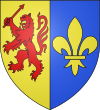Lapurdi
|
Labourd Lapurdi |
|||
|---|---|---|---|
|
|||
 Location of Labourd within the Pyrénées-Atlantiques departement and the Northern Basque Country. |
|||
| Country | France | ||
| Largest settlements |
List
|
||
| Area | |||
| • Total | 859 km2 (332 sq mi) | ||
| Population (2013) | |||
| • Total | 243.466 | ||
| • Density | 283,75/km2 (73,490/sq mi) | ||
| Time zone | CET (UTC+1) | ||
| • Summer (DST) | CEST (UTC+2) | ||
Labourd (Lapurdi in Basque; Lapurdum in Latin; Labord in Gascon) is a former French province and part of the present-day Pyrénées Atlantiques département. It is one of the traditional Basque provinces, and identified as one of the territorial component parts of the Basque Country by many, especially by the Basque nationalists.
Labourd extends from the Pyrenees to the river Adour, along the Bay of Biscay. To the south is Gipuzkoa and Navarre in Spain, to the east is Basse-Navarre, to the north are the Landes. It has an area of almost 900 km2 (347 sq mi) and a population of over 200,000 (115,154 in 1901; 209,913 in 1990), the most populous of the three French Basque provinces. Over 25% of the inhabitants speak Basque (17% in the Bayonne-Anglet-Biarritz zone, 43% in the rest). Labourd has also long had a Gascon-speaking tradition, noticeably next to the banks of the river Adour but also more diffusedly throughout the whole viscounty (about 20% in Bayonne-Anglet-Biarritz).
The main town of Labourd is Bayonne, although the capital up to the French Revolution was Ustaritz, 13 km away, where local Basque leaders assembled. Other important towns are Biarritz, Anglet (between Bayonne and Biarritz), Hendaye, Ciboure and Saint-Jean-de-Luz along the coast, and Hasparren inland. The area is famous for the five-day Fêtes de Bayonne and the red peppers of Espelette. Many tourists come to the coast, especially to Biarritz, and the hills and mountains of the interior for walking and agri-tourism. La Rhune (Larrun in Basque), a 900 m high hill, lies south of Saint-Jean-de-Luz on the border with Spain. The hill is a Basque symbol, with spectacular views from its peak.
...
Wikipedia


